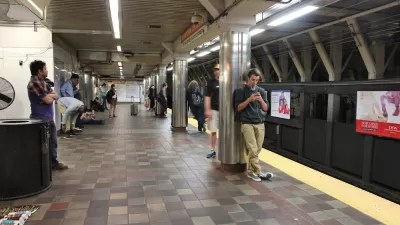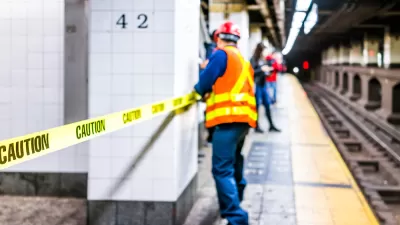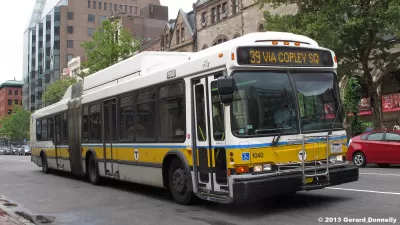A new estimate of how much it will cost to repair all of the infrastructure in the MBTA system places the price tag $3 billion higher than an estimate made only four years ago.

"The cost to fix or replace the MBTA’s aging equipment and upgrade to new, modern infrastructure is now valued at a cool $10 billion," reports Adam Vaccaro.
The newest figure is also " a dramatic jump from the already eye-popping estimate cited just four years ago," when the MBTA estimated the cost to repair the system's many capital assets at $7.3 billion. The figure includes the costs of maintaining and repairing "nearly all things transit," including "trains and buses, tracks and power systems, culverts and tunnels and bridges, and more," according to Vaccaro.
Much of the article, and the public relations messaging that has surrounded the announcement, is devoted to explaining the discrepancy between the 2015 figure and the 2019 figure:
The reason for the difference is that the latest review took a more in-depth look at various pieces of infrastructure, based on new federal standards. Also, it included costs that the prior number didn’t — such as the price of designing projects, upgrading infrastructure to include modern technology, and paying for bus diversions during major track work.
MBTA officials are also pointing out the improvements that have already been made, such as with the deployment of new buses in the system. "For example, a few years ago nearly three-quarters of the T’s vehicles were considered too old under federal standards. That number has since been reduced to 32 percent as hundreds of new buses have entered the system," writes Vaccaro.
FULL STORY: MBTA puts price tag for fixing the system at $10 billion

Planetizen Federal Action Tracker
A weekly monitor of how Trump’s orders and actions are impacting planners and planning in America.

Maui's Vacation Rental Debate Turns Ugly
Verbal attacks, misinformation campaigns and fistfights plague a high-stakes debate to convert thousands of vacation rentals into long-term housing.

San Francisco Suspends Traffic Calming Amidst Record Deaths
Citing “a challenging fiscal landscape,” the city will cease the program on the heels of 42 traffic deaths, including 24 pedestrians.

Defunct Pittsburgh Power Plant to Become Residential Tower
A decommissioned steam heat plant will be redeveloped into almost 100 affordable housing units.

Trump Prompts Restructuring of Transportation Research Board in “Unprecedented Overreach”
The TRB has eliminated more than half of its committees including those focused on climate, equity, and cities.

Amtrak Rolls Out New Orleans to Alabama “Mardi Gras” Train
The new service will operate morning and evening departures between Mobile and New Orleans.
Urban Design for Planners 1: Software Tools
This six-course series explores essential urban design concepts using open source software and equips planners with the tools they need to participate fully in the urban design process.
Planning for Universal Design
Learn the tools for implementing Universal Design in planning regulations.
Heyer Gruel & Associates PA
JM Goldson LLC
Custer County Colorado
City of Camden Redevelopment Agency
City of Astoria
Transportation Research & Education Center (TREC) at Portland State University
Jefferson Parish Government
Camden Redevelopment Agency
City of Claremont





























